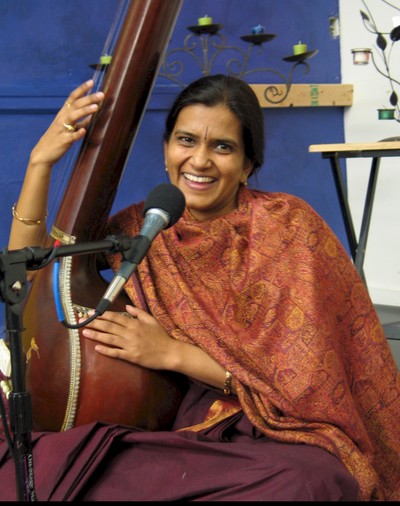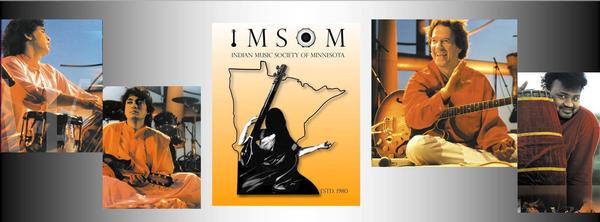Course in Hindustani Vocal music by Pooja Goswami
Speciality:
North Indian (Hindustani) Vocal Music
Short Desc:
Course in Hindustani Vocal Music at the U of M
Hours:
Tue - Thu 5:00 - 6:30PM (09-02-08 to 12-10-08)
Phone:
Contact:
For further information
please contact:
Pooja @ 612-709-1263
Pavan @ 612-508-3716
or send email to:
tabaliya@yahoo.com
Directions:
Please note: If you have questions about REGISTERING for this
course please call the U of M School of Music directly. All
phone numbers can be had by going to:
http://www.music.umn.edu/about/info.php
For more information on the course please call:
Pooja (612-709-1263) or Pavan (612-508-3716)
To enroll online:
http://www.onestop.umn.edu/onestop/registration.html
http://www.poojagoswamipavan.com/about/
https://www.facebook.com/groups/381720247728/
Email:
Description:
The School of Music at the University of MN, will once again be offering a course in Hindustani (North Indian) vocal music. Please note: If you have questions about REGISTERING for this course please call the U of M School of Music directly. All phone numbers can be had by going to: http://www.music.umn.edu/about/info.php For more information on the course please call: Pooja (612-709-1263) or Pavan (612-508-3716) pooja.goswami74@gmail.com or email: goswa005@umn.edu MUS 5950 Topics in Music "Introduction to North Indian Vocal Music" 3 credits, 5:00 - 6:30 P.M., Tue & Thu (09/02/08 - 12/10/08), Ferguson Hall 107 Instructor: Dr. Pooja Goswami Brief description: This course in elementary Hindustani (North Indian) vocal music exposes the student to the foundational concepts of raga and tala in historical and cultural context, through hands on vocal lessons and exercises, audio/video material, concert experience, classroom discussions and writing assignments. My effort will be geared towards teaching the rudiments of Indian classical music using voice as the principal instrument. Through this course I will attempt to convey the essence of one of the most ancient and complex musical systems of the world. This course aims at turning the learners' eyes and ears to the source of true enjoyment and understanding of the fantastic heritage of North Indian raga music. � Pooja Goswami Class Time: 30% lecture, 20% discussion, 50% singing Work Load: ~10 pages of reading per week, 15-20 pages of writing per semester, 2 paper(s), 3 written quizzes and one vocal quiz Grade: 25% written report(s)/paper(s), 15% quizzes, 20% class participation, 40% for vocal quiz Exam format: multiple choice and short answers MORE DETAILS BELOW: University of Minnesota's School of Music offers course in North Indian Vocal Music The course will be taught by Dr. Pooja Goswami, master vocalist visiting from Delhi (see instructor bio below). "Introduction to North Indian Vocal Music" is a one-semester course in Hindustani vocal music for beginners, that also includes elements of history, culture and theory as appropriate. The course is now listed on the U of M Course Registration Website and is open for registration. Please visit: http://www.onestop.umn.edu/onestop/registration.html Please note: If you have questions about REGISTERING for this course please call the U of M School of Music directly. All phone numbers can be had by going to: http://www.music.umn.edu/about/info.php Registration is limited to 20 seats for Fall 2008. Course number is MUS 5950. No prerequisites are necessary for the course except the ability to carry a tune and keep a steady rhythm. This is a detailed description of the course: Learn the cornerstones of North Indian Classical Music from a master artist. Along with lectures and readings in the history and theory of Hindustani music, students will also learn rudimentary exercises in singing and spoken rhythms. This course examines the classical music of Northern India in relationship to Indian culture and history. Students will learn the tenets of voice culture and foundational concepts of rhythmic practice in Hindustani music through intensive listening and hands-on practical exercises. These musical fundamentals will be contextualized through a study of their relationship to aesthetic and philosophical concepts, cultural practices and historical developments in the region. Through this combination of practical training and academic study in India's unique brand of musicology/ethnomusicology, students should gain new perspectives on music, its meaning and place, and a greater understanding of the diversity and possibilities of human expression. Prerequisites: This course has no specific prerequisites. However, prospective students will be expected to exhibit an appropriate level of musical aptitude. The ability to carry a tune and keep steady rhythm is necessary. Grading Option: A-F 3 credits (= 3 hrs per week) Expected enrollment: 20 (~ 40% undergraduate, 60% graduate) The course is intended for both majors and non-majors. Graduate students enrolled in this class will be expected to produce a 15 page final research paper in addition to the coursework expected from the rest of the students. Course Outline: I. VOICE CULTURE IN HINDUSTANI MUSIC 1. Musical voice and its cultivation 2. Vowel equalization 3. Foundation notes 4. Exercises for flexibility of voice (Sargam and Alankar) 5. Exercises of yoga and morning practice II. RAGA: THE MELODIC FRAMEWORK 1. The musical alphabet: notes, their combinations, Shrutis (microtones) 2. Introduction to the Khayal: the principal vocal genre in Hindustani music 3. Study of Khayal compositions in basic Ragas: Yaman, Bhairav, Bhairavi, Bhoop, Kafi 4. Treatment of the Raga in various genres:classical, semi- classical, folk and light-music III. TALA: THE RHYTHMIC FRAMEWORK 1. The foundations of the Hindustani rhythm system 2. Study of basic Talas: Teentaal, Ektaal, Jhaptaal, Dadra, Keharwa etc. 3. Treatment of the Tala in classical, semi-classical, folk and light-music 4. Introduction to compositions of rhythm: Kayda, Tihaai, Tukda in Teentaal All of the above will involve a significant amount of listening to music - live in class, on audio/video recordings and via the Internet. IV. LISTENING TO INDIAN CLASSICAL MUSIC 1. Typical concert format of vocal music (Khayal) 2. Typical concert format of instrumental music (Sitar/Tabla) 3. Listening assignments 4. Concert attendance assignments 5. Live demonstrations in class when possible Text Book: Sharma, Swatantra, Fundamentals of Indian Music, Pratibha Prakashan, 29/5 Shakti Nagar, Delhi, India, 1996. The instructor will provide copies of this textbook for a nominal fee. Evaluation of student achievement: There will be periodic quizzes on the lecture material and readings. Students will also be given exercises in singing and spoken rhythms, which they will be expected to practice daily. They will perform these assignments in every class. The final will consist of a written portion, based on the lectures and readings, and a performed portion, drawn from the daily exercises. About the instructor: Pooja Goswami, Ph.D. (Music) Dr. Pooja Goswami was born in a musical family and received her early training in Hindustani (North Indian) classical music (vocal) from her father Sri. Surendra Goswami. She received her M.Phil from the University of Delhi and completed a Ph.D. in Music in 2005, also from the University of Delhi. The subject of her Ph.D. thesis was the life and music of Pandit Amarnath, the foremost disciple of Ustad Amir Khan - an icon in Hindustani vocal music. Dr. Goswami is also trained in semi-classical music from the eminent vocalist Smt. Shanti Hiranand, the reigning queen of Thumri and Ghazal (semi-classical vocal genres) and the universally acclaimed successor of the legendary vocalist, the Late Begum Akhtar. The versatility in Dr. Goswami's repertoire is evident in her ability to sing Thumri, Dadra, Ghazal, Bhajan and various folk genres (e.g. Chaiti, Kajri) besides Khayals. Dr. Goswami has received the prestigious National Scholarship awarded by the Ministry of Human Resources. The many prestigious venues she has performed at include the India Habitat Center (New Delhi), the Sopan festival (New Delhi), Vietnam International Tourism Festival (Hanoi) and the Sankalp music society (Jaipur). Dr. Goswami recently co-composed the score for Pangea World Theater's "The Partition Project" staged in June 2006 in Minneapolis. She has performed widely within the USA, including performances at the University of Minnesota - Minneapolis (MN), Indian Music Society of Minnesota (IMSOM) - Minneapolis (MN), Amherst College - Amherst (MA), East Indian Music Academy - Queens (NY) etc. Presently Dr. Goswami is a visiting faculty at the School of Music, University of Minnesota, Minneapolis, teaching courses in Indian music and culture. Please note: If you have questions about REGISTERING for this course please call the U of M School of Music directly. All phone numbers can be had by going to: http://www.music.umn.edu/about/info.php For more information on the course please call: Pooja (612-709-1263) or Pavan (612-508-3716) or email: goswa005@umn.edu


